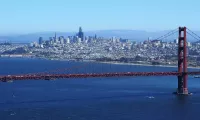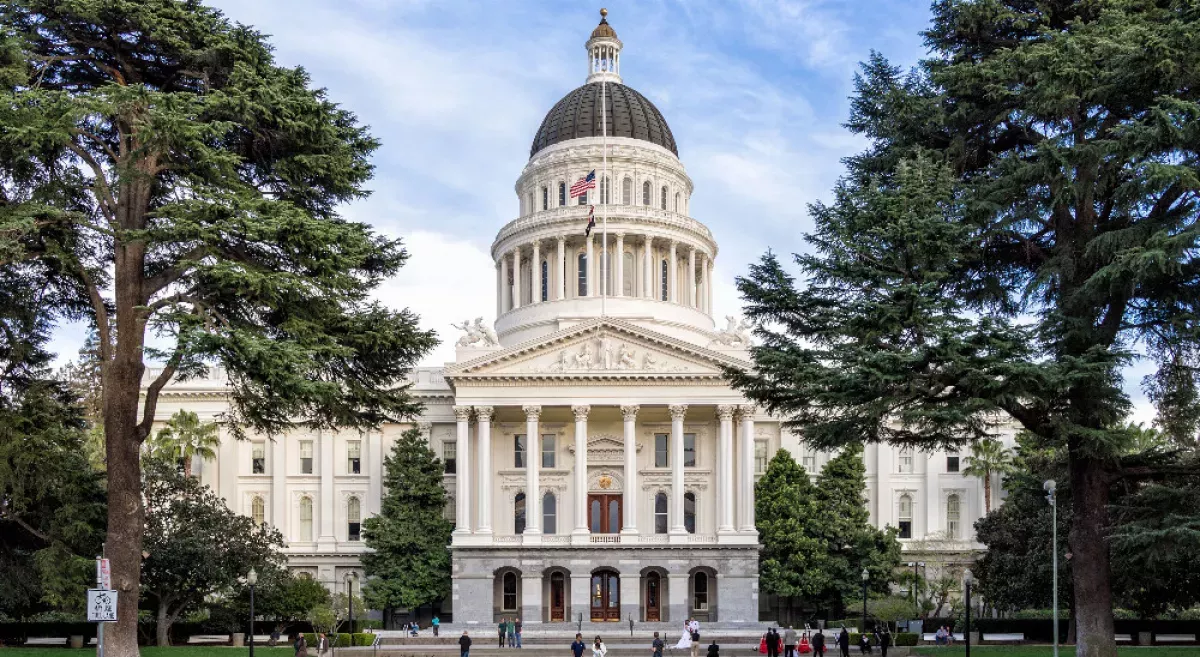Sacramento is the capital city of California, situated at the confluence of the Sacramento and American Rivers. With a population of over 524,000, it ranks as the fourth-most populous city in Northern California and the state's sixth-largest. It serves as the seat of both the California Legislature and the Governor's office. Economically and culturally, Sacramento is the central hub of the Greater Sacramento area, a metropolitan region encompassing over 2.6 million residents, making it the fourth-largest metropolitan area in California.
1900: Significant Snow Accumulations since 1900
Since 1900, there have only been three significant snow accumulations in Sacramento's downtown area.
1920: Adoption of the current city charter
In 1920, voters adopted Sacramento's current city charter, exempting it from many state laws and regulations.
1923: SMUD Creation Approved
In 1923, Sacramento voters approved the creation of the Sacramento Municipal Utility District (SMUD).
1924: Significant Events in 1924
In 1924, Standard Oil executive Verne McGeorge established McGeorge School of Law, Weinstock & Lubin opened a new store, the Senator Hotel was opened, Sacramento's drinking water became filtered, and boxer Georgie Lee fought Francisco Guilledo (Pancho Villa).
December 11, 1932: Near Record Low Temperature
On December 11, 1932, an area near Sacramento dipped to 17 °F (−8.3 °C).
1934: Last ocean-going vessel before Taipei Victory
In 1934, the steamship Harpoon was the last ocean-going vessel in Sacramento before the arrival of Taipei Victory.
May 6, 1942: Sacramento Assembly Center Opens
On May 6, 1942, the Sacramento Assembly Center (Walerga Assembly Center) opened to house Japanese Americans forcibly evacuated from the West Coast.
1943: Repeal of the Chinese Exclusion Act
The Chinese Exclusion Act, which contributed to discrimination against Sacramento's Chinatown, was not repealed until 1943.
April 1946: PG&E ordered to transfer to SMUD
In April 1946, after 12 years of litigation, a judge ordered Pacific Gas & Electric to transfer the title of Sacramento's electric distribution system to SMUD.
December 1947: Camp Kohler Fire and Temporary Housing
In December 1947, Camp Kohler was destroyed by a fire, and the former assembly center temporarily housed 234 returning Japanese American families who could not find housing.
1947: End of Poverty Ridge's wealthiest era
From 1868 to 1947, the Poverty Ridge Historic District was considered Sacramento's wealthiest neighborhood.
1947: Sacramento State College Founding
In 1947, Sacramento State College was founded, later becoming California State University, Sacramento.
1949: Groundbreaking on the Port of Sacramento
In 1949, ground was broken on the Port of Sacramento, marking the beginning of its construction.
1954: Sacramento State Hornets
Since 1954, the Sacramento State Hornets have won seven conference titles and have participated in four playoff appearances and two bowl games.
June 29, 1963: Arrival of the Motor Vessel Taipei Victory
On June 29, 1963, the Motor Vessel Taipei Victory, a Nationalist Chinese flagship, arrived at the Port of Sacramento, marking the first ocean-going vessel to dock there since 1934.
1964: Sacramento Country Day School Opened
In 1964, Sacramento Country Day School opened and offered Sacramento citizens an independent school affiliated with the California Association of Independent Schools.
1964: Merger of North Sacramento with Sacramento
In 1964, the City of North Sacramento merged with Sacramento, significantly increasing the city's population.
1967: Reagan becomes Governor and resides in Sacramento
In 1967, Ronald Reagan became the last Governor of California to live permanently in Sacramento.
1970: Sacramento Population makeup in 1970
In 1970 Non-Hispanic Whites were 71.4% of the Sacramento population.
1972: "Sacramento" song released
In 1972, the Scottish pop band Middle of the Road sang kindly of Sacramento in their European hit song "Sacramento".
1976: Last Significant Snow Accumulation
The last significant snow accumulation in Sacramento's downtown area occurred in 1976.
1977: Sacramento Metropolitan Arts Commission Established
In 1977, the Sacramento Metropolitan Arts Commission was established as the Sacramento arts council to provide arts programs for the city.
1978: Sacramento designated a City of Trees
In 1978, Sacramento was the first US city to be designated a City of Trees by the Arbor Day Foundation.
1980: Sacramento Flood in 1980
In 1980, Sacramento experienced another flood.
1983: California International Marathon established
The California International Marathon was established in 1983.
1985: Hugh Scrutton Killed by Bomb
In 1985, Hugh Scrutton, a computer store owner in Sacramento, was killed by a bomb.
1985: Kings came to Sacramento
In 1985, the Sacramento Kings of the National Basketball Association came to Sacramento from Kansas City.
1988: Founding of Masjid Annur
In 1988, Masjid Annur, an Islamic school, was founded in Sacramento.
December 22, 1990: Low Temperature Record
On December 22, 1990, Sacramento experienced a temperature of 18 °F (−7.8 °C).
1991: Capitol Casino Opening
In 1991, Capitol Casino opened in downtown Sacramento, offering various card games.
1991: Western Seminary Opens Sacramento Campus
In 1991, Western Seminary opened one of its four campuses in Sacramento, located on the campus of Arcade Church.
February 1992: Record Consecutive Days of Rain
In February 1992, Sacramento had 16 consecutive days of rain, resulting in an accumulation of 6.41 inches.
1996: Scrutton's death attributed to the Unabomber
In 1996, Hugh Scrutton's death was attributed to the Unabomber, Theodore Kaczynski.
1997: Sacramento Monarchs founding member of the WNBA
In 1997, the Sacramento Monarchs were one of the eight founding members of the WNBA.
2000: AAA minor league baseball returns to Sacramento
In 2000, AAA minor league baseball returned to Sacramento with the Sacramento River Cats.
2000: Transfer of McClellan Air Force Base to Sacramento County
In 2000, McClellan Air Force Base was transferred to Sacramento County and became McClellan Airfield.
2001: Over one million people attended the State Fair
More than one million people attended this fair in 2001.
January 2002: Traceable Snowfall in 2002
In January 2002, Sacramento had brief and traceable amounts of snowfall.
2002: Sacramento named "America's Most Diverse City"
In 2002, Sacramento was named "America's Most Diverse City" by the Civil Rights Project at Harvard University for Time magazine.
2003: Wells Fargo Pavilion built
In 2003, the Wells Fargo Pavilion was built atop the old Music Circus tent foundations as part of the H Street Theatre Complex.
2004: Sacramento State Enrollment in 2004
In 2004, Sacramento State had 22,555 undergraduate students and 5,417 graduate students in its eight colleges.
2005: Sacramento Monarchs won the WNBA Championship
In 2005, the Sacramento Monarchs won the WNBA Championship.
September 2006: Designated as a Silver Level Bicycle Friendly Community
In September 2006, Sacramento was designated as a Silver Level Bicycle Friendly Community by the League of American Bicyclists.
2006: West Sacramento takes responsibility for Port of Sacramento
As of 2006, the city of West Sacramento took responsibility for the Port of Sacramento due to operating losses and competition from the Port of Stockton.
2006: California Automobile Museum displays vehicles from 1880 to 2006
In 2006, the California Automobile Museum, located just south of Old Sacramento, showcased automotive history and vehicles from 1880 to 2006, establishing itself as the oldest non-profit automotive museum in the West.
2006: Leland Stanford Mansion Restored
In 2006, the Leland Stanford Mansion was completely restored. It now serves as the State's official address for diplomatic and business receptions.
2007: Sacramento Horror Film Festival Founded
Founded in 2007, the Sacramento Horror Film Festival showcases feature-length and short films as well as live musical and theatrical performances in the horror and macabre genres.
2007: Establishment of The Art Institute of California – Sacramento
In 2007, The Art Institute of California – Sacramento, a branch of The Art Institute of California – Los Angeles, was established.
2007: Sacramento Valley Rail Station Renovations in 2007
In 2007, the Sacramento Valley Rail Station underwent extensive renovations.
November 2009: Sacramento Monarchs folded
In November 2009, the Sacramento Monarchs of the WNBA folded.
December 2009: Traceable Snowfall in 2009
In December 2009, Sacramento had brief and traceable amounts of snowfall.
2009: School District Employment Statistics in 2009
As of 2009, the Sacramento area's schools employed 9,600 elementary school teachers and 7,410 middle school teachers.
2009: Sacramento Museum Day draws record crowd
In 2009, Sacramento Museum Day attracted more than 80,000 people, marking the largest attendance in the event's history.
2010: Sacramento population in 2010
In 2010 the United States Census reported Sacramento had a population of 466,488.
2010: Ethnic groups in 2010
In 2010 the population consisted of Mexican, Puerto Rican, Salvadoran, Guatemalan, and Nicaraguan heritage. Non-Hispanic Whites were 34.5% of the population.
2010: Capital Stage performs aboard Delta King
In 2010, Capital Stage performed aboard the Delta King.
2010: Crocker Art Museum Expansion
In 2010, the Crocker Art Museum completed an expansion, tripling its exhibit space.
2010: Droughts since 2010
Since 2010, statewide droughts in California have strained Sacramento's water security.
February 2011: Traceable Snowfall in 2011
In February 2011, Sacramento had brief and traceable amounts of snowfall.
2011: Walk Score Ranking in 2011
A 2011 study by Walk Score ranked Sacramento as the 24th most walkable of the fifty largest U.S. cities.
2011: Capital Stage performs aboard Delta King
Capital Stage continued to perform aboard the Delta King until the end of the 2010–2011 season.
2012: Sacramento markets itself as "America's Farm-to-Fork Capital"
In 2012, Sacramento started a marketing campaign as "America's Farm-to-Fork Capital". Also in 2012, The Kitchen restaurant was nominated for Outstanding Restaurant by the James Beard Foundation.
2012: Aftershock Festival Established
Since 2012, Sacramento hosts the four-day Aftershock Festival at Discovery Park.
January 21, 2013: Controlling interest in Sacramento Kings sold
On January 21, 2013, a controlling interest in the Sacramento Kings was sold to Chris Hansen, who intended to move the franchise to Seattle.
May 16, 2013: NBA Board of Governors votes to keep Kings in Sacramento
On May 16, 2013, the NBA Board of Governors voted 22–8 to keep the Sacramento Kings in Sacramento.
2013: Sacramento's Tourism in 2013
In 2013, Sacramento received 15.3 million visitors, according to the Sacramento Convention and Visitors Bureau.
2013: Sacramento's park system ranked third-best in the U.S.
In its 2013 ParkScore ranking, The Trust for Public Land reported Sacramento was tied with San Francisco and Boston for having the third-best park system among the 50 most populous U.S. cities.
2013: Sacramento Heatwave previously played in the Sacramento area until 2013
The Sacramento Heatwave of the American Basketball Association previously played in the Sacramento area until 2013.
April 2014: Sacramento Republic FC inaugural game
In April 2014, Sacramento Republic FC of USL Championship began play at Hughes Stadium before a sellout crowd, setting a USL Pro regular-season single-game attendance record.
2014: Intended move of the Sacramento Kings
Chris Hansen originally intended to move the franchise to Seattle for the 2013–2014 NBA season.
2015: Expansion of University of the Pacific Sacramento Campus
In 2015, the University of the Pacific's Sacramento Campus expanded to become a comprehensive graduate and professional campus, including programs in analytics, business, education, health sciences, and public policy.
September 30, 2016: Opening of the Golden 1 Center
On September 30, 2016, Sacramento's Golden 1 Center opened with a final estimated cost of $558.2 million.
2016: Downtown Commons Opened in 2016
In 2016, Downtown Commons (DOCO) opened along with the Golden 1 Center, featuring the Sawyer skyscraper, a Macy's anchor store, and an IMAX theater.
2016: Wide Open Walls Festival Inception
Since the festival's inception in 2016, the Wide Open Walls Festival has facilitated the addition of more than 140 murals across the city by artists from around the world.
2017: Sacramento beer scene growing as of 2017
As of 2017, Sacramento's growing beer scene is evident, with over 60 microbreweries in the region.
2017: "City of Trees" Slogan Controversy on Water Tower in 2017
In 2017, the "City of Trees" slogan on a Sacramento water tower was repainted with "America's Farm-to-Fork Capital", sparking a citizen protest.
2017: Sacramento Jazz Jubilee held until 2017
The Sacramento Jazz Jubilee, held every Memorial Day weekend, occurred until 2017.
2018: The B Street Theatre completes move to Sophia Tsokopoulos Center for the Arts
In 2018, The B Street Theatre completed its move into the new Sophia Tsokopoulos Center for the Arts.
October 2019: Republic FC's Major League Soccer expansion bid approved
In October 2019, Republic FC's Major League Soccer expansion bid was approved.
2019: Sacramento International Airport Passenger Count in 2019
In 2019, Sacramento International Airport served more than 13 million passengers.
2019: Sacramento Theatre Company prepares to celebrate its 75th season
In the Fall of 2019, the Sacramento Theatre Company prepared to celebrate its 75th season at the H Street Theatre Complex.
2020: Sacramento's Population in 2020
In 2020, Sacramento's population was recorded at 524,943, making it the fourth-most populous city in Northern California.
February 26, 2021: Republic FC's MLS bid on indefinite hiatus
As of February 26, 2021, Republic FC's Major League Soccer expansion bid is on indefinite hiatus.
2021: Museum of Science and Curiosity Opens
In 2021, the Museum of Science and Curiosity (MOSAC) opened in the restored historic power station building of Matsui Waterfront Park.
September 6, 2022: High Temperature Record
On September 6, 2022, Sacramento experienced a temperature of 116 °F (46.7 °C).
2022: Republic FC's MLS play was expected in 2022
Republic FC's Major League Soccer expansion bid was approved and the team was expected to begin MLS play in the 2022 season.
2023: Top employers in Sacramento County as of 2023
As of 2023, data was collected on the top employers in the County of Sacramento.
2023: Sacramento has 14 sister cities
As of 2023, the City of Sacramento has 14 sister cities.
2023: Republic FC's MLS play delayed until 2023
Republic FC's Major League Soccer expansion bid was approved and the team was expected to begin MLS play in the 2022 season, until being delayed by COVID-19 to the 2023 season.
2024: City Council Members in 2024
As of 2024, Kevin McCarty is the mayor of Sacramento, and the council members are Angelique Ashby, Allen Warren, Jeff Harris, Steve Hansen, Jay Schenirer, Rich Jennings, and Larry Carr. The City of Sacramento is part of Sacramento County.
2024: The Fire Spectacular is still planned for fall 2024
Jim Souza, the lead organizer of the event, came under controversy after local H.O.A members reported hooded individuals wearing black fire emblems strolling around the park and announced the event is still planned for fall 2024 of this year.
2025: Athletics to play at Sutter Health Park
Beginning in 2025, the Athletics of Major League Baseball will temporarily play at Sutter Health Park.
2026: Altamont Corridor Express Rail Service Expected
In 2026, Altamont Corridor Express commuter rail service is expected to be routed through Sacramento.
2026: Additional Amtrak Service Expected
In 2026, an additional Amtrak service under this banner is expected to be routed through Midtown.
2027: Athletics to play at Sutter Health Park until 2027
The Athletics of Major League Baseball will temporarily play at Sutter Health Park from 2025 to 2027.
2028: Option for Athletics to play at Sutter Health Park in 2028
The Athletics of Major League Baseball, as part of their relocation from Oakland to Las Vegas, will temporarily play at Sutter Health Park from 2025 to 2027 (with an option for 2028).
Mentioned in this timeline

Basketball is a team sport played on a rectangular court...
IMAX is a proprietary system utilizing high-resolution cameras film formats...

Wells Fargo Company is a multinational financial services institution operating...
California is a U S state on the Pacific Coast...

San Francisco is a major commercial financial and cultural hub...

Football is a family of team sports primarily involving kicking...
Trending

3 months ago Michelle Obama: America 'not ready' for a woman president, cites sexism concerns.

1 hour ago Apple MacBook Pro: Touchscreen, Dynamic Island, and New Interface Coming Soon.

15 minutes ago Ethereum Price Faces Resistance at $1,950 Amidst Market Repricing Concerns.
15 minutes ago BP Receives Hold Ratings Amid Strategy Updates and Increased Rating by Argus.
1 hour ago Whitefox & Fluid Quip collaborate; Low-carbon ethanol boosted; Indoor plants aid climate resilience.
1 hour ago HSBC: Enterprise Software Strong, AI Enhances Capabilities, Valuations Historically Low.
Popular

Jesse Jackson is an American civil rights activist politician and...

Susan Rice is an American diplomat and public official prominent...

Barack Obama the th U S President - was the...

Michael Joseph Jackson the King of Pop was a highly...

XXXTentacion born Jahseh Dwayne Ricardo Onfroy was a controversial yet...

Bernie Sanders is a prominent American politician currently serving as...
